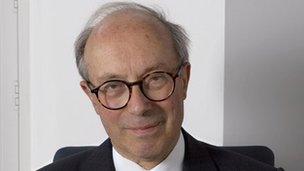Lord Hope says corroboration law reform 'potentially dangerous'
- Published

Lord Hope retired from his position as deputy president of the UK Supreme Court in June
One of Scotland's most senior legal figures has said proposed changes to the law on corroboration could be "quite dangerous".
Lord Hope of Craighead said he would be "very sad" to see the safeguard go.
Corroboration - the need for evidence in criminal trials to come from two sources - has been a requirement in Scots law for centuries.
The Scottish government wants to remove the barriers that might prevent cases such as rape being taken forward.
It said the requirement for corroboration could prevent strong cases being prosecuted and the reforms represents a move towards focusing on the best quality of evidence available, rather than meeting an outdated technical requirement.
In an interview with Holyrood Magazine, Lord Hope - who was deputy president of the UK Supreme Court until four months ago - said he was concerned that without corroboration people could be convicted because they had confessed to a crime.
He was quoted by the magazine as saying: "I just express concern that the proposal seems very far-reaching and, potentially, quite dangerous if you have a situation where somebody is at risk of being convicted on his own confession which I would have thought was absolutely fundamentally wrong in Scots law.
"It may be that the number of cases that go to trial now on confessions are comparatively few, but we developed our law of corroboration initially as a barrier against people being taken to court on a confession which had been extracted by torture.
"This is in the early 18th century when things were very, very different, and people reacted against this, and I'd be very sad to see that kind of protection go."
'More selective'
He acknowledged there was a "real problem" with cases which take place where there are no witnesses other than the victim and accused, such as many rapes and sexual assaults.
But he added: "I would have thought a more selective way of dealing with the problem would be wiser than what I understand to be the solution that is being proposed just now."
The Scottish government's Criminal Justice (Scotland) Bill proposes other law changes to balance the rights of suspects, victims and witnesses, including increasing the number of jurors required for a majority guilty verdict.
The changes to corroboration have been opposed by many solicitors, advocates and even some judges, although Rape Crisis and Police Scotland are among those in favour of the proposals.
The bill is to be debated by Holyrood's Justice Committee later this month.
'Progressive approach'
A Scottish government spokeswoman said: "In abolishing the requirement for corroboration we are seeking to ensure that the police and prosecutors can focus on seeking the best quality of evidence available.
"We consider this to be a more progressive approach than trying to meet an outdated technical requirement which is a barrier to prosecutions - particularly in sexual offence and domestic abuse cases - that would go ahead in any other jurisdiction.
"COPFS and Police Scotland have strongly supported this reform."
She added: "Let's also be clear that the removal for the routine requirement for corroboration does not mean that anyone will be prosecuted simply on the evidence of one individual, whether a police officer or a victim of crime."
Lord Hope retired from his position at the UK Supreme Court in June this year.
He had previously served as head of Scotland's judiciary in the posts of Lord President of the Court of Session and Lord Justice General.
- Published25 September 2013
- Published21 July 2013
- Published26 June 2013
- Published21 June 2013
- Published20 June 2012
- Published13 December 2011